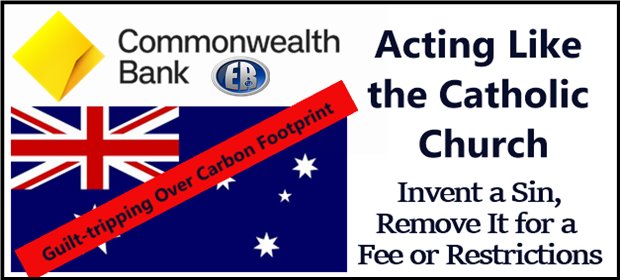
ER Editor: Again, we feel it’s a movie designed to show us how bad things could have got. While there is no proof for this hypothesis, we invite readers to consider what Benjamin Fulford said in his highly interesting blog post of yesterday (‘KM’ = Khazarian Mafia, reference to the Rothschilds and Co.):
At this point, the KM control grid has been reduced to Canada, the US, Ukraine and Switzerland.
********
Australia’s Banks have introduced a Social Credit System by linking Publics transactions to their Carbon Footprint
Banks that turn green, yes, but at what cost? Commonwealth Bank, an Australian bank also known as CBA, that already refuses to allow its clients to support The Expose, has teamed up for the first time with CoGo, a startup that specializes in “carbon management solutions”, to create a feature that monitors the carbon footprint of its customers through their transactions.
As part of this partnership, a select group of customers can view their carbon footprint through their online banking apps. In addition, they can purchase carbon credits to offset excess emissions from previous months.
Customers can pay a fee to help offset their CO2 footprint within the app. (ER: Isn’t this like the Catholic Church of old inventing ‘sin’, then charging clients for getting rid of it?)
Customers get notified when their individual purchases exceed the “acceptable” carbon average. The customer would then get guilt-inducing messages on his phone, like “8 trees were cut down”.

By Sikh for Truth; Editor of Truth Talk UK
Towards mandatory monitoring of carbon footprints?
By combining the bank’s extensive customer roster with CoGo’s industry-leading capabilities, we will soon be able to offer enhanced transparency to customers so they can take concrete steps in reducing their environmental footprint, ” CommBank Group Director Angus Sullivan said in a statement on October 5.
He also added: ‘Our data capability will provide greater personalisation for customers over time, including more granular information about their carbon footprint with the option to offset individual transactions.’ (ER: Is this English?)
The bank calculates a customer’s carbon footprint based on the ‘transactions made on your CommBank credit or debit cards’.
It says the national average for carbon emitted in kilograms is 1,280 – while a sustainable figure is around 200. (ER: a suspiciously large difference)
This upcoming feature will be available to all bank customers next year. Initially presented as a personalized carbon footprint.
Commonwealth Bank says the data is private and not given to CoGo, and that eventually, the data will be so specific it can be broken down into individual transactions.
Despite a supposedly better understanding of carbon footprints and their compensation, there is still a fear that such programs will become mandatory. This will restrict individual purchases under the guise of combating global warming.
In the scientific journal Nature, four climate experts raised the idea of a disturbing program to better control individual consumer CO2 expenditures.
A kind of personal map on which the carbon footprint would be expressed in the form of quotas. These would decrease according to travel, heating and electricity costs and other domestic lifestyles.
Anyone who exceeds the limit in accordance with the national objectives of each country would thus be obliged to buy additional units on the personal carbon market. Reselling would be done by those with units to resell.
Would the travel bans and other extreme measures taken by governments around the world during the Covid-19 crisis have prepared the ground for a certain docility towards the introduction of revised financial control measures under the guise of the climate debate?
US Senator Rand Paul had already sounded the alarm about Davos attendees for whom “privacy is not a concern. […] They want to follow everyone with a QR code”.
He also said: “The real danger here that’s even more dangerous than all their phoney caring about carbon footprint,” he said. “The real danger is this look how bad your government is in a country where you get to vote for these people. This would be a government, a world government where you don’t get to vote on anybody. This is everybody’s worst nightmare.”
The measure of Commonwealth Bank is also in line with that of Credit Suisse. Through its “Tree Print” study, the European banking group also points the finger at Western lifestyles in the face of reforestation needs.
As a result, for a sustainable lifestyle according to the Paris Agreement, the “ideal” consumer would take only three showers a week, eat no more than 25 grams of cheese, eat insects, take only one short flight a year and only wash their clothes once per month.
In the UK we are already aware of the infamous “Nudge Unit” which is working with UK banks to implement a social credit system disguised as carbon guilt trip trackers.
According to the Nudge unit, banks should use their “wealth of data” to provide “carbon feedback” on transactions, and introduce social credit-style rewards and incentives to encourage “sustainable behaviours.”
We’re moving towards a net zero social credit system based on sustainable behaviour and a highly controlled populace.
Source

••••
The Liberty Beacon Project is now expanding at a near exponential rate, and for this we are grateful and excited! But we must also be practical. For 7 years we have not asked for any donations, and have built this project with our own funds as we grew. We are now experiencing ever increasing growing pains due to the large number of websites and projects we represent. So we have just installed donation buttons on our websites and ask that you consider this when you visit them. Nothing is too small. We thank you for all your support and your considerations … (TLB)
••••
Comment Policy: As a privately owned web site, we reserve the right to remove comments that contain spam, advertising, vulgarity, threats of violence, racism, or personal/abusive attacks on other users. This also applies to trolling, the use of more than one alias, or just intentional mischief. Enforcement of this policy is at the discretion of this websites administrators. Repeat offenders may be blocked or permanently banned without prior warning.
••••
Disclaimer: TLB websites contain copyrighted material the use of which has not always been specifically authorized by the copyright owner. We are making such material available to our readers under the provisions of “fair use” in an effort to advance a better understanding of political, health, economic and social issues. The material on this site is distributed without profit to those who have expressed a prior interest in receiving it for research and educational purposes. If you wish to use copyrighted material for purposes other than “fair use” you must request permission from the copyright owner.
••••
Disclaimer: The information and opinions shared are for informational purposes only including, but not limited to, text, graphics, images and other material are not intended as medical advice or instruction. Nothing mentioned is intended to be a substitute for professional medical advice, diagnosis or treatment.





Leave a Reply